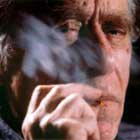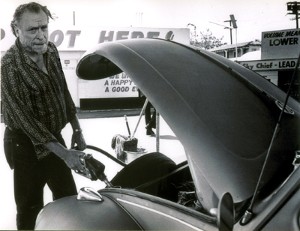Bukowski: Born into This


Many consider Charles Bukowski (1920-1994) one of the greatest poets of the twentieth century. His poems were simple, raw, and brought the hoity-toity art of poetry down to the masses. He was notorious for drinking, cussing, womanizing, and fighting, which undoubtedly increased his popularity over the years. Bukowski: Born into This is an excellent introduction to Bukowski. It demonstrates who he is, how he came to be, and best of all, has lots of footage of the Bukowski himself reading his poems. His voice is raw, hoarse, and he lingers slowly over his words. He gracefully, almost tenderly reads his works, which contrasts sharply with the blunt, dark imagery of his words.
Director John Dullaghan shot the film over seven years, interviewing many of Bukowski's friends and admirers, and gathering together a wealth of footage of Bukowski from over the years. He shows a belligerent, most likely drunk Bukowski at readings in the late sixties, and an older, calmer Bukowski (yet still prone to rages) in the eighties. Bukowski was born in Germany, but grew up in the United States. His father beat him as a child, something that would remain scarred in his psyche for years to come.
He wrote at a furious pace, sending off as much as he could to various journals, but he was rarely published. It was not until a man named John Martin discovered him, and created Black Sparrow Press to publish Bukowski's work that his fame began rising astronomically. After that, it was like a dam had burst. The more that Bukowski wrote, the more famous he became. Books of poetry gave way to books of prose. And the more he wrote, the better he became.
Unlike many other authors, there was not much hidden behind his 'persona.' He wrote what he knew, and the dark characters that inhabited his films were mere extensions of himself. Born into This is full of interviews of fans and friends from various parts of Bukowski's life. They do not really shed any new light on Bukowski, they serve more to round out the picture Bukowski has given of himself. The most impressive aspect of Dullaghan's film is that it shows how, over time and the influence of his wife Linda, Bukowski softened some of his rough edges. A scene where he tears up when reading an emotional poem is strong, almost contradictory to the persona he typically puts forth. As he got older, the womanizing lessened, and as he neared the end of his life, so did the drinking. But losing these aspects of his life never seemed to blunt the rawness of his poetry.